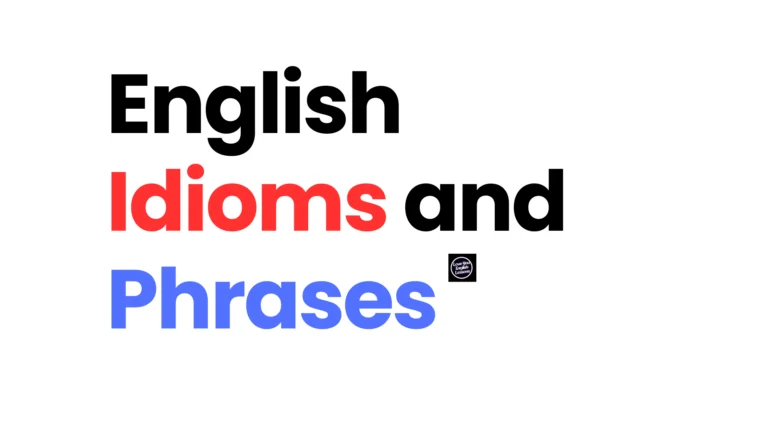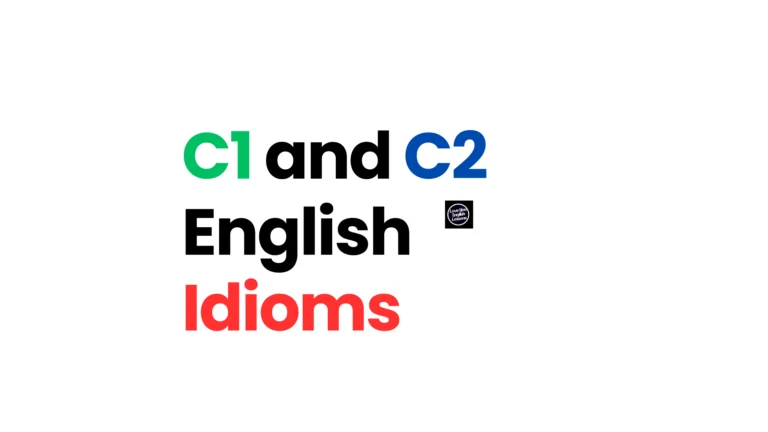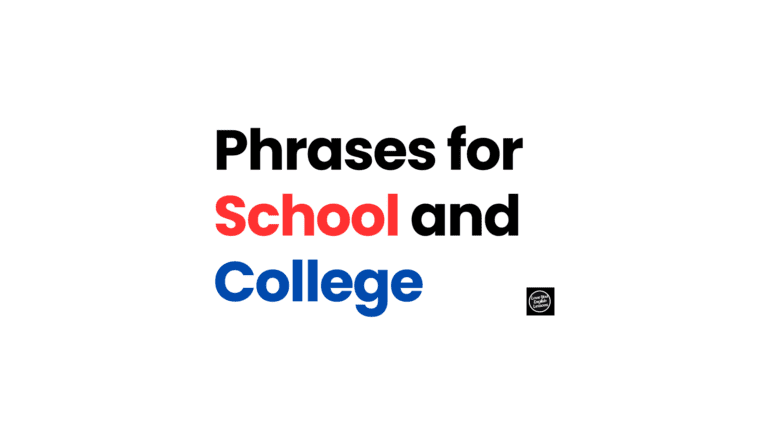C1 & C2 English Idioms
Hello everyone!
Welcome to this lesson on advanced English idioms!
If you want to improve your English skills, learning idioms is really important.
So, idioms are phrases that have a different meaning than what the words actually say, which can be tricky but interesting to learn.
In this lesson, we will explore advanced English idioms, discussing what they mean, where they come from, and how to use them.
Whether you’re getting ready for an English test or just want to sound more fluent, mastering these idioms will make you a better communicator.
Now, let’s dive in and discover the secrets of advanced English idioms together!
Now, let’s check out the idioms and their meanings that we will be discussing.
Bite the bullet: To face a difficult situation bravely.
Break the ice: To initiate a conversation or activity in a social setting.
Cost an arm and a leg: To be very expensive.
Cut to the chase: To get to the main point without wasting time.
Piece of cake: Something very easy to do.
Hit the nail on the head: To describe or identify something accurately.
A blessing in disguise: Something that seems bad at first but turns out to be good.
Jump on the bandwagon: To join a popular trend or activity.
Kill two birds with one stone: To accomplish two things at once.
Let the cat out of the bag: To reveal a secret.
Rain on someone’s parade: To spoil someone’s plans or happiness.
Take with a grain of salt: To not completely believe something or be skeptical.
Under the weather: To feel sick or not well.
Burn the midnight oil: To work late into the night.
Back to the drawing board: To start over because a plan failed.
These idioms are commonly used in English conversations and can add depth and expressiveness to your language skills.
Now, one by one, we’ll look at their usage and the situations we can use them.
First, we have “bite the bullet”.
So, we use this phrase when you have to do something tough or endure something uncomfortable without complaining.
For example, imagine you have to get a tooth pulled at the dentist, and you’re scared of the pain. But you know it’s necessary, so you “bite the bullet” and go through with it without making a fuss.
So, we use “bite the bullet” when we’re dealing with something challenging and you decide to face it with courage, even if it’s not easy.
Break the ice
So, we use this phrase when you want to start a conversation or activity to make everyone feel relaxed and friendly.
For example, imagine you’re at a party where you don’t know anyone. To “break the ice,” you might start talking about the weather or compliment someone’s outfit. This helps people feel more at ease and opens up the opportunity for further conversation.
So, we use “break the ice” when we want to make a situation more friendly and comfortable by starting a conversation or activity that helps people relax and connect with each other.
Next up, we have “Cost an arm and a leg”.
Cost an arm and a leg
“Cost an arm and a leg” is an idiom that means something is very expensive.
So, we use this phrase when you want to express that something costs a lot of money, much more than you expected or think is reasonable.
Now, let’s talk about “cut to the chase”.
Also read:
- English Conversations: Friendly Business Meetings
- English Conversation Practice: The Doctor’s Office
- English Conversation: Friendly Conversation in a Retail Store
- English Conversation: A Visit to the Post Office
Cut to the chase
We use this phrase when you want to encourage someone to stop talking around the topic and focus on what really matters.
For example, if you’re in a meeting and people are discussing minor issues instead of addressing the main problem, you might say, “Let’s cut to the chase and figure out how to solve this big problem.” This means you want everyone to stop talking about less important things and focus on the main issue.
So, we use “cut to the chase” when we want to direct attention to the most important part of a conversation or situation and avoid wasting time on irrelevant details.
For example, if someone asks you if you can solve a math problem that you find very easy, you might say, “Sure, that’s a piece of cake!” This means you think the math problem is really easy for you.
So, we use “piece of cake” when we want to express that something is very easy to do and doesn’t require much effort or skill.
Now, we have hit the nail on the head.
Hit the nail on the head:
“Hit the nail on the head” is an idiom that means to describe or identify something accurately.
We use this phrase when someone makes a comment or observation that is exactly right or perfectly captures the essence of a situation.
For example, if you’re discussing a problem at work and someone suggests a solution that solves the problem perfectly, you might say, “Wow, you really hit the nail on the head with that idea!” This means that their idea was spot on and addressed the issue perfectly.
So, we use “hit the nail on the head” when we want to praise someone for making a very accurate comment, observation, or suggestion that perfectly captures the essence of a situation or problem.
Next one is interesting.
A blessing in disguise:
“A blessing in disguise” is an idiom that means something that seems bad or unfortunate at first but turns out to be good in the end.
We use this phrase when you want to talk about a situation where a negative event or experience leads to a positive outcome.
For example, imagine you lose your job, which seems like a bad thing. However, you then find a new job that you love and pays better, so losing your old job was actually a good thing in the long run. You might say, “Losing my job was a blessing in disguise because it led me to a better opportunity.”
So, we use “a blessing in disguise” when we want to talk about how something that initially seems negative or unfortunate actually turns out to be beneficial or advantageous in the end.
Let’s jump on “jump on the bandwagon”.
Jump on the bandwagon:
“Jump on the bandwagon” is an idiom that means to join a popular trend or activity.
We use this phrase when someone starts doing something because it’s popular or fashionable, even if they didn’t show interest in it before.
For example, if a new diet becomes popular and many people start following it, you might say, “A lot of people are jumping on the bandwagon and trying out this new diet.” This means that many people are joining the trend and following the diet because it’s popular.
So, we use “jump on the bandwagon” when we want to talk about someone joining a popular trend or activity because it’s popular or fashionable, even if they weren’t interested in it before.
Next is:
Kill two birds with one stone:
“Kill two birds with one stone” is an idiom that means to accomplish two things at once with a single action.
We use this phrase when you want to describe a situation where you achieve two goals or complete two tasks by doing one thing.
For example, if you have to go to the store to buy groceries and also need to drop off a package at the post office, you might say, “I can kill two birds with one stone by going to the store near the post office and doing both tasks at once.” This means that you can accomplish both tasks by making a single trip.
So, we use “kill two birds with one stone” when we want to talk about achieving two goals or completing two tasks by doing one action or taking advantage of a single opportunity.
This one surely you are going to love.
Let the cat out of the bag:
“Let the cat out of the bag” is an idiom that means to reveal a secret or something that was supposed to be kept confidential.
We use this phrase when someone accidentally or intentionally reveals information that was meant to be kept hidden.
For example, if you were planning a surprise party for your friend and someone accidentally tells your friend about it, you might say, “Oops, you let the cat out of the bag about the surprise party!” This means that the surprise was spoiled because the secret was revealed.
So, we use “let the cat out of the bag” when we want to talk about someone revealing a secret or sharing information that was meant to be kept confidential.
Rain on someone’s parade:
“Rain on someone’s parade” is an idiom that means to spoil someone’s plans or happiness by saying or doing something negative.
We use this phrase when someone does or says something that ruins a happy or positive moment for someone else.
For example, if someone is excited about their upcoming vacation and you tell them about all the things that could go wrong, you might say, “Don’t rain on their parade by talking about all the negatives!” This means that you shouldn’t spoil their excitement by being negative.
So, we use “rain on someone’s parade” when we want to talk about someone spoiling a happy or positive moment for someone else by being negative or critical.
Take with a grain of salt:
“Take with a grain of salt” is an idiom that means to not completely believe something or to be skeptical about information you receive.
We use this phrase when you want to advise someone to consider information with caution and not take it too seriously.
For example, if a friend tells you a rumor about someone, but you’re not sure if it’s true, you might say, “I’ll take that with a grain of salt until I get more information.” This means you won’t fully believe the rumor until you have more evidence.
So, we use “take with a grain of salt” when we want to express skepticism or caution about information and advise someone to not believe it completely until they have more evidence or confirmation.
Under the weather:
“Under the weather” is an idiom that means to feel sick or not well.
We use this phrase when you want to describe someone’s health condition, especially when they are feeling a bit ill but not seriously sick.
For example, if a coworker asks how you’re doing and you’re feeling a bit sick with a cold, you might say, “I’m feeling a bit under the weather today.” This means you’re not feeling well but it’s nothing serious.
So, we use “under the weather” when we want to describe feeling a bit sick or unwell, usually with minor health issues like a cold or headache.
Burn the midnight oil:
“Burn the midnight oil” is an idiom that means to work late into the night or to put in extra effort and long hours to get something done.
We use this phrase when you want to describe working hard or staying up late to finish a task or project.
For example, if you have a big presentation due tomorrow and you need to work late to prepare for it, you might say, “I’m going to burn the midnight oil to make sure my presentation is ready.” This means you’ll be working late into the night to get your work done.
So, we use “burn the midnight oil” when we want to talk about working hard or staying up late to complete a task or project.
Back to the drawing board:
“Back to the drawing board” is an idiom that means to start over because a plan or idea failed or didn’t work out as expected.
We use this phrase when you want to express the need to go back to the beginning and come up with a new plan or idea.
For example, if a team is working on a project but their initial plan didn’t succeed, they might say, “Well, it looks like we’re back to the drawing board to come up with a new strategy.” This means they need to start over and rethink their approach.
So, we use “back to the drawing board” when we want to talk about starting over and coming up with a new plan or idea because the previous one didn’t work out.
Final thoughts:
We’ve learned a lot about idiomatic expressions, from basic ones to more complicated and subtle phrases.
When we use these idioms in our English conversations and writing, you’re getting closer to speaking fluently and sounding like a native.
Remember, idioms make language more interesting and show cultural understanding, making your communication more exciting and captivating.
Keep practicing, discovering new idioms, and paying attention to how native speakers use them in different situations.
You’re doing a great job, and before you know it, you’ll be using advanced English idioms like an expert!
Enjoy learning!
____________________
Check out these awesome phrases & Idioms books I recommend:
IDIOMS and PHRASES Anglo,Synonyms and Antonyms Anglo,One Word Substitution






